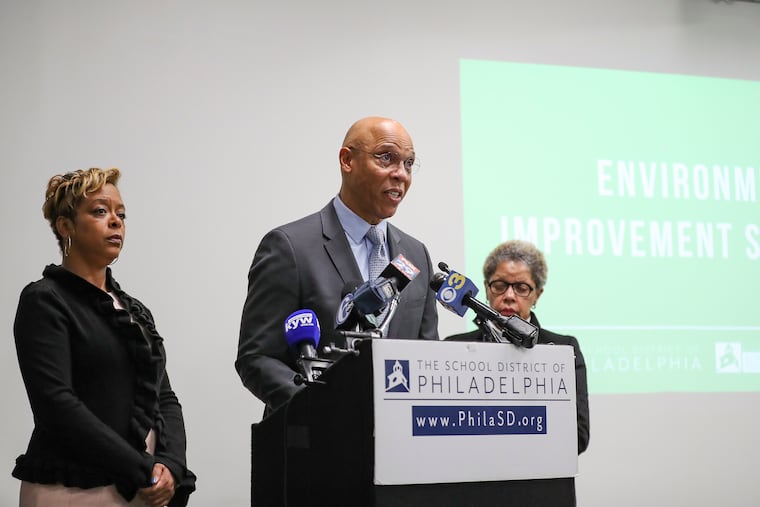The Philly school board is facing legal challenges to its new public comment policy
The lawsuit seeks an immediate injunction to halt the new speakers' policy, which limits the number of people allowed to speak at board meetings.

Two community groups filed suit against the Philadelphia school board Friday, saying a new policy limiting public comment at meetings violates Pennsylvania law by “foreclosing the public from meaningfully participating in government operations.”
For years, the school board and its predecessor, the School Reform Commission, allowed an unlimited number of speakers three minutes each to testify at their meetings. That changed in January, when the board limited public comment slots and shortened the time members of the public could speak.
The change drew outrage, and the ACLU of Pennsylvania formally objected. President Joyce Wilkerson said the board, which is shifting how it does business to focus more narrowly on academics, was within its rights and was offering other ways for the public to make their voices heard.
» READ MORE: ‘We are not learning enough’: In marathon meeting, Philly school board gets an earful
ACLU lawyers filed the suit Friday in the Philadelphia Court of Common Pleas on behalf of UrbEd, a group founded by Philadelphia public school students, and the Alliance for Philadelphia Public Schools, an organization of mostly retired educators who fight against school privatization and other issues.
The Pennsylvania Sunshine Act requires agencies to “provide a reasonable opportunity at each advertised regular meeting and advertised special meeting for [the public] to comment on matters of concern, official action, or deliberation which are or may be before the board or council prior to taking official action.” The suit says the board has not provided that opportunity.
On Thursday night, the board held one of two annual special sessions devoted solely to public comment, temporarily lifting the speakers’ limit and expanding the time each had to talk. Over 130 speakers signed up to testify — and the meeting lasted five hours.
The lawsuit seeks an immediate injunction to halt the new speakers’ policy.
Reggie Shuford, executive director of ACLU of Pennsylvania, said all city residents have a right to participate in meetings of the board, which runs the Philadelphia School District with its $3.5 billion budget and 200,000 students in traditional public and charter schools.
“The school board has not provided any legitimate reason for why they have had to suddenly change a policy that has been in effect for at least five years,” Shuford said in a statement. “Even during the COVID-19 pandemic, they have managed to conduct their business while respecting the rights of the public to comment. Unfortunately, the board’s new policy significantly restricts the public’s ability to participate and influence board actions.”
» READ MORE: Remember this name: Tamir Harper, a kid from Southwest Philly, is going places
UrbEd founder and executive director Tamir Harper, a 2018 graduate of Science Leadership Academy and current American University student, said the public comment policy must change.
“The Board of Education exists to serve the students of Philadelphia,” Harper said. “By rights, and by law, it is their job to hear from those students, and the new policy limits the opportunity for students to be heard by them. That is why UrbEd has joined this effort to end the district’s limits on public participation.”
Lisa Haver and Karel Kilimnik, APPS cofounders, said in a statement that the board “cannot rule by fiat, arbitrarily changing the rules for public speakers from one public meeting to the next. The board, as the district’s governing body, must allow adequate time for parents, educators, students, and community members to speak on crucial issues facing the district.”
A spokesperson for the school board said officials are reviewing the suit, but in a February letter to the ACLU, Wilkerson said the board believes “that our procedures are not only reasonable and compliant under the letter and spirit of the law, but also will allow for the board to continue to offer speakers the option to comment virtually or in person even when we return to in-person meetings, and for more people to participate in and observe the board’s business.”